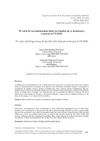Please use this identifier to cite or link to this item:
https://accedacris.ulpgc.es/jspui/handle/10553/135678
| DC Field | Value | Language |
|---|---|---|
| dc.contributor.author | Hernández Franco, Juan | en_US |
| dc.contributor.author | Irigoyen López, Antonio | en_US |
| dc.date.accessioned | 2025-01-27T20:54:25Z | - |
| dc.date.available | 2025-01-27T20:54:25Z | - |
| dc.date.issued | 2025 | en_US |
| dc.identifier.issn | 2341-1112 | en_US |
| dc.identifier.uri | https://accedacris.ulpgc.es/handle/10553/135678 | - |
| dc.description.abstract | La historia de los sentimientos se ha consolidado como una de las vías más adecuadas para conocer cómo se transformaron las familias en el periodo que declinaba la familia extensa y comenzaba a constituirse la familia nuclear, llamada también por otros autores familia sentimental. Algunas familias de la aristocracia española pueden ser un excelente observatorio para analizar este proceso. Desde el último tercio del siglo xviii, influenciadas por la sensibilidad ilustrada, hicieron uso de la afectividad como forma de vínculo y convivencia familiar, aunque ello no implicó renunciar a los lazos de la sangre y a la cultura de los ancestros. | en_US |
| dc.description.abstract | The history of feelings has been consolidated as one of the most appropriate ways to know how families were transformed in the period when the extended family declined and the nuclear family began to be constituted, also called sentimental family by other authors. Some families of the Spanish aristocracy can be an excellent observatory to analyze this process. From the last third of the 18th century, influenced by the enlightened sensibility, they valued affectivity as the foundation of family coexistence, without renouncing the ties of blood and the culture of the ancestors. | en_US |
| dc.language | spa | en_US |
| dc.relation.ispartof | Vegueta: Anuario de la Facultad de Geografía e Historia | en_US |
| dc.source | Vegueta: Anuario de la Facultad de Geografía e Historia [ISSN 1133-598X, eISSN 2341-1112], v. 25, nº 1, p. 331-354, (Enero 2025) | en_US |
| dc.subject | 630903 Familia, parentesco | en_US |
| dc.subject | 550402 Historia contemporánea | en_US |
| dc.subject | 610603 Emoción | en_US |
| dc.subject.other | Aristocracia | en_US |
| dc.subject.other | Familia | en_US |
| dc.subject.other | Sentimiento | en_US |
| dc.subject.other | Egodocumento | en_US |
| dc.subject.other | España | en_US |
| dc.title | El valor de los sentimientos entre las familias de la aristocracia española (1770-1830) | en_US |
| dc.title.alternative | The value of feelings among the families of the Spanish aristocracy (1770-1830) | en_US |
| dc.type | info:eu-repo/semantics/article | en_US |
| dc.type | Article | en_US |
| dc.identifier.doi | 10.51349/veg.2025.1.13 | en_US |
| dc.description.lastpage | 354 | en_US |
| dc.description.firstpage | 331 | en_US |
| dc.relation.volume | 25 | en_US |
| dc.investigacion | Artes y Humanidades | en_US |
| dc.type2 | Artículo | en_US |
| dc.description.numberofpages | 24 | en_US |
| dc.utils.revision | Sí | en_US |
| dc.date.coverdate | Enero 2025 | en_US |
| dc.identifier.ulpgc | No | en_US |
| dc.contributor.buulpgc | BU-HUM | en_US |
| dc.description.sjr | 0,153 | |
| dc.description.sjrq | Q2 | |
| dc.description.esci | ESCI | |
| dc.description.fecytq | Q1 | |
| dc.description.fecytpuntuacion | 48,77 | |
| dc.description.dialnetimpact | 0,0 | |
| dc.description.dialnetq | Q1 | |
| dc.description.miaricds | 10,0 | |
| dc.description.erihplus | ERIH PLUS | |
| item.grantfulltext | open | - |
| item.fulltext | Con texto completo | - |
| Appears in Collections: | Artículos | |
Page view(s)
134
checked on Jan 15, 2026
Download(s)
76
checked on Jan 15, 2026
Google ScholarTM
Check
Altmetric
Share
Export metadata
Items in accedaCRIS are protected by copyright, with all rights reserved, unless otherwise indicated.
